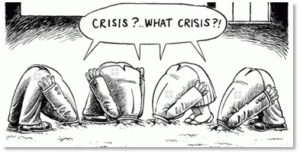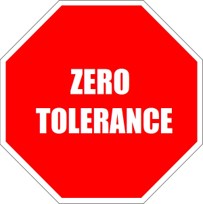 The results of last week’s XpertHR survey on sexual harassment policies in business raised an eyebrow for me because the participants were human resources professionals.
The results of last week’s XpertHR survey on sexual harassment policies in business raised an eyebrow for me because the participants were human resources professionals.
Now, we expect these folks to be at the leading edge on issues related to corporate compensation, fairness, workplace culture, and harassment. After all, HR staff represent the company’s experts on what is known as “human capital.” That’s the business term for workers who manufacture, market and sell products. You know—human beings.
Of Greater Concern
The study tells us that slightly more than half (53%) of the 548 companies surveyed say that sexual harassment policies and training will be “of greater concern” this year. Yet not even half (38%) plan to update their existing policies.
So, after the cascading revelations of sexual impropriety and outright rape that have emerged in the past 12 months, HR executives still feel pretty darn confident that their companies have the right stuff in place. Nuthin’ to worry about.
In my contrarian mind, this equates to complacency. After all, the world has moved on since these plans were put in place. So how can the same policies and training that didn’t work so well before the #MeToo movement happened function just great now?
The Pre-#MeToo World
Before Bill Cosby and Harvey Weinstein, companies tended to look in the other direction when sexual misconduct reared its ugly head. If forced to deal with it, they pulled several items from their management toolkit: fire the woman, transfer the man, force the woman to sign a confidentiality agreement, or promote the man.
They didn’t worry too much about negative publicity. If a “catch-and-kill” media story didn’t keep the victim quiet, executives could always count on two things: (1) most men wouldn’t believe the woman’s claims, and (2) they could keep her quiet by threatening to destroy her career. (And often deliver on that threat.)
The Post-#MeToo World
 Now we are in a whole new world, one in which people believe a woman who claims that she has been harassed or worse. It’s also a world in which the offenders have suffered repercussions for their behavior—sometimes severe ones. Just consider a few:
Now we are in a whole new world, one in which people believe a woman who claims that she has been harassed or worse. It’s also a world in which the offenders have suffered repercussions for their behavior—sometimes severe ones. Just consider a few:
- The Weinstein Company: This near-bankrupt studio has been put up for sale several times with no buyers. Harvey Weinstein has lost his job and his supporters and enablers are losing their comfortable sinecures. Mr. Weinstein could be indicted and face possible jail time.
- Woody Allen: His last movie was a critical disaster and his next may never be released. A long list of actors has announced they will not work with him.
- Kevin Spacey: The actor was fired from his Netflix series, House of Cards, which is going on without him.
- Politicians: Multiple members of Congress have resigned voluntarily, been forced to resign, or lost their elections after being accused of harassment. Here’s the long list of offenders that came to light in 2017.
Retreating from Reality
In this environment, you would think that companies would leap to strengthen their sexual harassment training, beef up their policies, put stronger penalties in place, and make sure than bystanders have reason to speak up.
But no. According to Jessica Webb-Ayer, Legal Editor at XpertHR:
“Three quarters of companies currently offer sexual harassment prevention training, while 22% do not. When asked about their plans for sexual harassment training in 2018, just 29% were planning to offer it, 43% were unsure if they would offer, and 27% were not planning to offer training. And, only 18% are planning to offer bystander training.”
One of three reactions on the part of company executives is likely to be happening behind the scenes here:
- They listen to a report from the V.P. of Human Resources—who is usually a woman—and dismiss her as an alarmist.
- They ignore the whole issue because their company has it under control.
- They reassure one another that they’ll deal with it when it happens.
Ostriches All in a Row
 I see a whole row of executive ostriches with their heads firmly planted in the sand or with their fingers in their ears, saying, “La, la, la, la, la. I can’t hear you.” In my career, I saw this happen to HR managers who were trying to do a good job and get out ahead of a problem, only to be stonewalled by the guys at the top. I’m sure the HR professionals in the trenches could fill books with stories about when it happened to them.
I see a whole row of executive ostriches with their heads firmly planted in the sand or with their fingers in their ears, saying, “La, la, la, la, la. I can’t hear you.” In my career, I saw this happen to HR managers who were trying to do a good job and get out ahead of a problem, only to be stonewalled by the guys at the top. I’m sure the HR professionals in the trenches could fill books with stories about when it happened to them.
Denial is powerful. Probably the only force that’s stronger is inertia. So I’m skeptical when I read these survey results:
- 71% were confident that employees in their workplace felt safe to report sexual harassment.
- 81% felt confident in their workplace’s ability to fairly investigate sexual harassment claims.
- 74% felt that senior management team models good behavior and sets the tone for a harassment-free environment.
I wonder how many people in The Weinstein Company would have agreed with these statements.
Five Fundamentals for Addressing Sexual Harassment
 XpertHR lists five fundamentals any organization should have in place to address sexual harassment:
XpertHR lists five fundamentals any organization should have in place to address sexual harassment:
- A zero-tolerance sexual harassment policy;
- Harassment training;
- A multichannel complaint process;
- Investigation procedures; and
- Retaliation protections.
If your company doesn’t have these five fundamentals in place, your confidence is probably complacency. Even if you do, don’t think that harassment problems won’t emerge and / fester, perhaps at the worst possible time.
Human nature being what it is, it pays for companies to be prepared — even when you don’t want to think about the problem, put protections in place, or plan for the worst.
